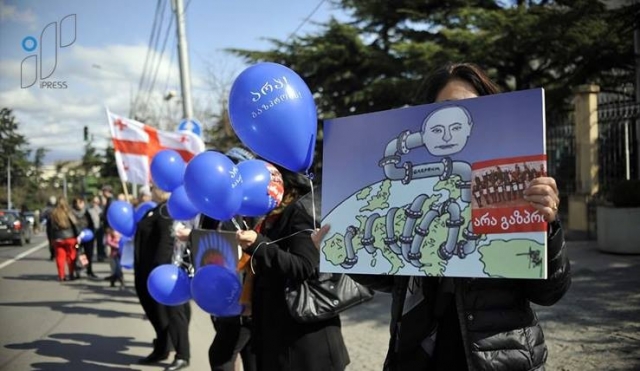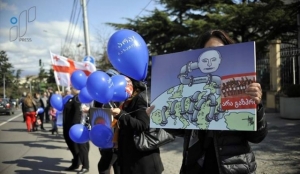Anti-Russian Protest Held in Tbilisi Over Proposed Gazprom Deal
TBILISI – Thousands gathered in Georgia’s capital Tbilisi on Sunday to protest negotiations between the government and Russia's state-owned energy giant Gazprom.
Linked arm-in-arm in a 7 kilometer-long human chain from the government’s headquarters to the Russian Embassy and chanting ‘No to Gazprom’, the protestors said they feared the Kremlin-controlled company’s growing influence on the Georgian energy market would again make the small South Caucasus nation dependent on its former imperial master.
The protest was organized by the opposition United National Movement (UNM), former president Mikheil Saakashvili's staunchly pro-Western party.
The UNM has repeatedly accused the Kremlin of ‘weaponizing’ energy relations and using Gazprom as a political tool in a bid to prevent Georgia from forging closer political and economic ties with the West.
Georgia's Energy Minister Kahka Kaladze announced on 5 March that the government had abandoned its initial plan to buy natural gas from Russia after it had secured a favorable deal with neighboring Azerbaijan for additional volumes of gas.
UNM party leader Davit Bakradze claimed the government’s reversal on a potential Gazprom deal was a result of growing public pressure on the ruling Georgian Dream party to abandon negotiations with Gazprom.
"Our final goal will only be achieved when we force the government to say no to Georgia being returned to the corrosive influence of Gazprom," said Bakradze.
In January 2006, twin explosions on the Mozdok-Tbilisi gas pipeline suspended supplies to Georgia during a particularly cold winter.
Tbilisi claims the explosions were carried out by Russia’s feared FSB secret intelligence services to force the country into selling its pipelines to Gazprom amid Georgia’s drive towards further integration with the West.
Moscow has repeatedly denied the claims, blaming the explosions on insurgent groups from the North Caucasus operating in Georgia’s Pankisi Gorge, home to 20,000 ethnic Chechens.
The Baku-Tbilisi-Ceyhan pipeline and the South Caucasus Pipeline that carry Caspian Sea oil and gas to Western Europe via Georgia and Turkey – bypassing Russia – are vital for reducing Europe's dependence on Russian energy supplies.
Russia and Georgia fought a brief five-day war in August 2008 that left hundreds dead and resulted in the ethnic cleansing of thousands of Georgians living in the country’s Moscow-backed breakaway region South Ossetia.
Russia shortly thereafter recognized South Ossetia’s independence from Georgia and still continues to maintain a massive military presence in the region.
Many in Georgia fear that Russian President Vladimir Putin’s increasingly belligerent actions both militarily and economically point to his determination to regain a degree of authoritarian control over a region he considers part of Russia’s historic sphere of influence.
Protestors held dozens of Ukrainian flags and portraits of captured Ukrainian military pilot Nadya Savchenko, who was kidnapped and illegally imprisoned in Russia on murder charges stemming from the conflict in eastern Ukraine, during the Sunday rally.
Georgian President Giorgi Margvelashvili has said that the failure of the international community to punish Russia for its 2008 invasion of Georgia has let Moscow believe it has a free hand to destabilize the countries that once constituted the Soviet Union.
Photo: Ipress












